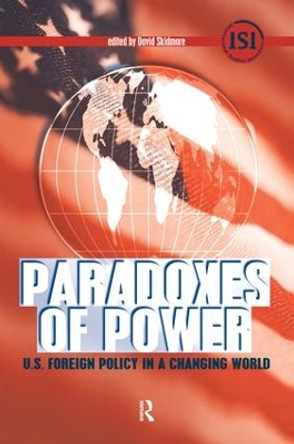Description
The pattern of multilateral engagement and unilateral retrenchment in American foreign policy from the Cold War through the Clinton, Bush, and Obama years presents a puzzle. What accounts for the unilateralist turn? Is it a passing aberration attributable to the neoconservative ideology of the Bush administration? What then of the disengagement evident earlier during Clinton's presidency, or its continuation under Obama? Was the U.S. investment in multilateral institutions following World War II an anomaly? Or is the more recent retreat from international institutions the irregularity?
Skidmore traces U.S. unilateralism to the structural effects of the end of the Cold War, both domestically and abroad, to argue that the United States was more hegemonic than multilateralist-a rule-maker, not a rule-taker. An "institutional bargain" existed under the Cold War threat from the Soviets, but absent those imperatives the United States has been less willing to provide collective goods through strong international institutions and other states are less willing to defer to U.S. exemptions. On the home front, the post-Cold War political environment has made it more difficult for presidents to resist the appeals of powerful interests who are threatened by multilateral commitments.
This book demonstrates that American unilateralism has deeper roots and more resilience than many expect. The unilateral temptation can only be overcome through new political bargains domestically and internationally that permit multilateral engagement, even the absence of great power rivalry.
About the Author
David Skidmore is professor of politics and international relations at Drake University. He is Director of the Drake University Center for Global Citizenship and past Director of the Drake Curriculum and First Year Seminar programs. His research and teaching interests lie in the areas of American foreign policy, international political economy and international relations theory.
Reviews
"In this volume, David Skidmore offers a careful and sobering assessment of the tenacity of unilateralism in U.S. foreign policy over time. Skidmore also shows how President Barack Obama has been unable so far to counteract the underlying structural obstacles to a more mulitlateralist foreign policy. This volume's last chapter should be a 'must read' for U.S. foreign policy makers committed to making U.S. foreign policy more effective by increasing its legitimacy in the eyes of others."
-Ralph G. Carter, Texas Christian University
"David Skidmore's new book offers a stimulating challenge to theories that posit sharp changes in American foreign policy during recent decades-namely, from post-World War II multilateralism to post-September 11 unilateralism. He argues that structural constraints provide a better explanation of foreign policy behavior than presidential ideology and, thus, that there are some important unilateralist continuities across the three most recent administrations. Sixteen case studies across several important issue areas vividly illustrate his thesis."
-Ole Holsti, Duke University
"In The Unilateralist Temptation in American Foreign Policy, David Skidmore laments the lack of multilateralism in American foreign policy and outlines a structural explanation-several important international and domestic constraints-to account for it. Although the Cold War years yielded greater multilateralism by the United States, Skidmore argues, the post-Cold War years are more challenging for such international collaboration by any administration, regardless of ideological orientation. A provocative read."
-James M. McCormick, Iowa State University
"Those who were hoping for, or predicting, a more multilateral U.S. foreign policy under Barack Obama will continue to be disappointed, argues David Skidmore. And they are going to have to respond to Skidmore's lucid argument and abundant evidence that Presidents, Democratic and Republican, are pushed by international and domestic factors to exempt America from international rules."
-John Owen, University of Virginia
Book Information
ISBN 9780415885409
Author David Skidmore
Format Paperback
Page Count 168
Imprint Routledge
Publisher Taylor & Francis Ltd
Weight(grams) 226g





